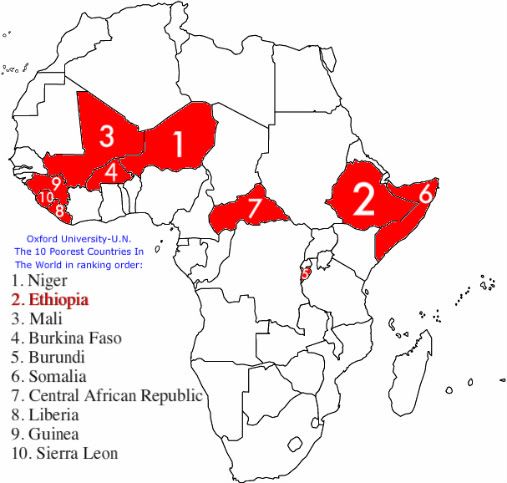
Jan 6th 2011 | from PRINT EDITION
..MUCH has been written about the rise of the BRICs (Brazil, Russia, India and China) and the shift in economic power eastward as Asia outruns the rest of the world. But the surprising success story of the past decade lies elsewhere. An analysis by The Economist finds that over the ten years to 2010, no fewer than six of the world’s ten fastest-growing economies were in sub-Saharan Africa (see table).
The only BRIC country to make the top ten was China, in second place behind Angola. The other five African sprinters were Nigeria, Ethiopia, Chad, Mozambique and Rwanda, all with annual growth rates of around 8% or more. During the two decades to 2000 only one African economy (Uganda) made the top ten, against nine from Asia. On IMF forecasts Africa will grab seven of the top ten places over the next five years (our ranking excludes countries with a population of less than 10m as well as Iraq and Afghanistan, which could both rebound strongly in the years ahead).
Over the past decade sub-Saharan Africa’s real GDP growth rate jumped to an annual average of 5.7%, up from only 2.4% over the previous two decades. That beat Latin America’s 3.3%, but not emerging Asia’s 7.9%. Asia’s stunning performance largely reflects the vast weight of China and India; most economies saw much slower growth, such as 4% in South Korea and Taiwan. The simple unweighted average of countries’ growth rates was virtually identical in Africa and Asia.
.Over the next five years Africa’s is likely to take the lead (see chart). In other words, the average African economy will outpace its Asian counterpart. Looking even farther ahead, Standard Chartered forecasts that Africa’s economy will grow at an average annual rate of 7% over the next 20 years, slightly faster than China’s.
So it should, of course. Poorer economies have more potential for catch-up growth. The scandal was that Africa’s real GDP per head fell for so many years. In 1980 Africans had an average income per head almost four times bigger than the Chinese. Today the Chinese are more than three times richer. Africa’s rapidly rising population still dampens its growth in real income per head but that, too, has risen by an annual rate of 3% since 2000—almost twice as fast as the global average.
For Western firms Africa’s economy still looks tiny, accounting for only 2% of world output. Emerging Asia’s is ten times larger. But Africa’s share is rising, not only because of brisker growth but because GDP has been seriously understated in many economies. In November the size of Ghana’s economy was revised up by a massive 75% after government statisticians improved their data and added in industries such as telecoms. Other countries are likely to revise their GDP levels and growth rates upward over the coming years.
Africa’s changing fortunes have largely been driven by China’s surging demand for raw materials and higher commodity prices, but other factors have also counted. Africa has benefited from big inflows of foreign direct investment, especially from China, as well as foreign aid and debt relief. Urbanisation and rising incomes have fuelled faster growth in domestic demand.
Economic management has improved, too. Government revenues have been bolstered in recent years by high commodity prices and rapid growth. But instead of going on a spending spree as in the past some governments, such as Tanzania’s and Mozambique’s, have put money aside, cushioning their economies in the recession.
Some ambled through the decade rather than sprinted. Africa’s biggest economy by far, South Africa, is one of its laggards: it posted average annual growth of only 3.5% over the past decade. Indeed, it may be overtaken in size by Nigeria within ten to 15 years if Nigeria’s bold banking reforms are extended to the power and the oil industries. But the big challenge for all mineral exporters will be providing jobs for a population expected to grow by 50% between 2010 and 2030.
Commodity-driven growth does not generate many jobs; and commodity prices could fall. So governments need to diversify their economies. There are some glimmers. Countries such as Uganda and Kenya that do not depend on mineral exports are also growing faster than before, partly because they have increased manufacturing exports. Standard Chartered thinks that Africa could become a significant manufacturing centre.
Formidable obstacles to Africa’s continued progress loom, among them political instability, the weak rule of law, chronic corruption, infrastructure bottlenecks, and poor health and education. Without reforms, Africa will not be able to sustain faster growth. But its lion economies are earning a place alongside Asia’s tigers.



